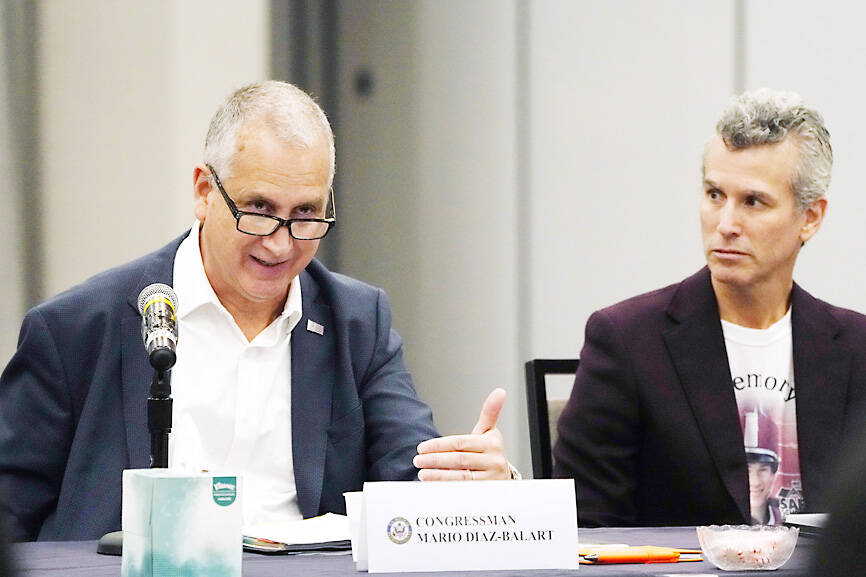US lawmakers across party lines on Tuesday condemned a parliamentary body in Central America for its decision to replace Taiwan with China as a permanent observer in the wake of most of the organization’s members switching diplomatic recognition to China.
In a statement on X, US Representative Mario Diaz-Balart, cochair of the Congressional Taiwan Caucus, said that the decision to cancel Taiwan’s permanent observer status in the Central American Parliament, known by its Spanish acronym PARLACEN, was “a condemnable attack on democracy.”
Earlier in the day, the Ministry of Foreign Affairs condemned the decision and announced its withdrawal with immediate effect from the Central American Parliament to safeguard national dignity, and also condemned the decision from PARLACEN.

Photo: AP
Taipei’s withdrawal came in the wake of the organization’s approval — following a vote of 73-32 with nine abstentions — of the entry of the People’s Republic of China into the organization as a permanent observer during a plenary assembly in Nicaragua on Monday.
Taiwan is a key democratic ally and partner of the US, and it is crucial that the administration of US President Joe Biden support and promote Taiwan’s rightful position on the international stage, Diaz-Balart wrote on the social media platform.
PARLACEN, which was set up in 1991, has six member countries: the Dominican Republic, El Salvador, Guatemala, Honduras, Nicaragua and Panama. Taiwan joined the parliamentary body as a permanent observer in 1999.
Guatemala, where the parliament is based, is the only member that has official ties with Taiwan. The others have all switched diplomatic recognition to Beijing in recent years.
US Senator Marsha Blackburn said that the US should continue to stand by Taiwan to tackle the growing influence of China worldwide.
US senators Tim Kaine and Marco Rubio also issued a joint statement condemning the Central American Parliament for the proposal to expel Taiwan’s Legislative Yuan and instead recognize the Chinese National People’s Congress as a permanent observer.
“Since 1999, Taiwan has served as a strong partner in its role as a permanent observer of the Central American Parliament, encouraging good governance and economic development in our hemisphere, while China’s regime has consistently undermined democracy, hindered sustainable growth in the region, and subjected Uighurs in Xinjiang to state-sponsored genocide, torture, rape and arbitrary detention,” Kaine and Rubio said in the statement.
“As leaders of the Foreign Relations Subcommittee overseeing the western hemisphere, we condemn this vote to expel Taiwan and admit China,” they said.
Kaine and Rubio are the chair and ranking member of the US Senate Foreign Relations Subcommittee on the Western Hemisphere.
The proposal to revoke the PARLACEN permanent observer status of the Legislative Yuan and replace it with the Chinese body was raised by Nicaraguan representatives.
The ministry accused Nicaraguan lawmakers, Nicaraguan President Daniel Ortega and other pro-China lawmakers in the PARLACEN of “currying favor” with Beijing and disregarding Taiwan’s decades-long contributions to the parliamentary organization.
Central America was once Taiwan’s staunchest base of diplomatic support, with all seven countries still recognizing Taipei as of 2006.
However, Costa Rica severed ties in 2007, followed by Panama, El Salvador and Nicaragua in 2017, 2018 and 2021 respectively.
Following Honduras’ decision to cut ties with Taiwan in March, Guatemala and Belize are the only countries in Central America to maintain diplomatic ties with Taipei.

The Ministry of Economic Affairs has fined Taobao NT$1.2 million (US$36,912) for advertisements that exceed its approved business scope, requiring the Chinese e-commerce platform to make corrections in the first half of this year or its license may be revoked. Lawmakers have called for stricter enforcement of Chinese e-commerce platforms and measures to prevent China from laundering its goods through Taiwan in response to US President Donald Trump’s heavy tariffs on China. The Legislative Yuan’s Finance Committee met today to discuss policies to prevent China from dumping goods in Taiwan, inviting government agencies to report. Democratic Progressive Party Legislator Kuo Kuo-wen (郭國文) said

The Ministry of Economic Affairs has fined Taobao NT$1.2 million (US$36,900) for advertisements that exceeded its approved business scope and ordered the Chinese e-commerce platform to make corrections in the first half of this year or its license would be revoked. Lawmakers have called for stricter supervision of Chinese e-commerce platforms and more stringent measures to prevent China from laundering its goods through Taiwan as US President Donald Trump’s administration cracks down on origin laundering. The legislature’s Finance Committee yesterday met to discuss policies to prevent China from dumping goods in Taiwan, inviting government agencies to report on the matter. Democratic Progressive Party

Taiwan and its Pacific ally Tuvalu on Tuesday signed two accords aimed at facilitating bilateral cooperation on labor affairs, according to Taiwan’s Ministry of Foreign Affairs (MOFA). The governments inked two agreements in Taipei, witnessed by Foreign Minister Lin Chia-lung (林佳龍) and visiting Deputy Tuvaluan Prime Minister Panapasi Nelesone, MOFA said in a news release. According to MOFA, the agreements will facilitate cooperation on labor issues and allow the two sides to mutually recognize seafarers’ certificates and related training. Taiwan would also continue to collaborate with Tuvalu across various fields to promote economic prosperity as well as the well-being of their

Sung Chien-liang (宋建樑), who led efforts to recall Democratic Progressive Party (DPP) Legislator Lee Kun-cheng (李坤城), was released on bail of NT$80,000 today amid outcry over his decision to wear a Nazi armband to questioning the night before. Sung arrived at the New Taipei District Prosecutors’ Office for questioning in a recall petition forgery case last night wearing a red armband bearing a swastika, carrying a copy of Adolf Hitler’s Mein Kampf and giving a Nazi salute. Sung left the building at 1:15am without the armband and covering the book with his coat. Lee said today that this is a serious